|
Continuing Education Courses at the 11th European Conference of Medical and Health Libraries We have been very lucky with the teachers; we can offer you a nice mixture of courses in different kind of subject areas. Our leading idea has been that the courses could give you something concrete to put into practice but also give a bit wider and deeper thoughts around your daily work. We have had a great help from previous years' CE courses in EAHIL: good teachers and interesting subject areas. And also we have got very good ideas and best practices from our EAHIL colleagues. Here, like everywhere else, it is the networking that helps work to proceed smoothly, so that there always is light ahead. Course fees: 60 € all the 4-hour courses for EAHIL conference participants; 80 € for others 80 € the course "Bridging the Gap between PubMed and the Entrez Life Science Databases (hands-on)" by David Herron (6 h); 100 € for others Note: The course fees don't include lunch. Greetings from the working group for Continuing education courses at EAHIL 2008 in Helsinki |
|
Anne Brice & Jo Hunter: A User-Friendly Approach to Becoming an Evidence-Based Practitioner Monday 23rd June 14:00-18:00 Course description: What does evidence-based practice mean? Are we doing it already? How can we use some simple tools and techniques to improve our use of research? These and other questions will be covered in this workshop and will draw on examples taken from practical experience. Evidence-based practice involves applying the results from research to our day-to-day practice as information staff, in order to improve the service we provide to our users. This workshop will be of interest to all information professionals, whether new or established, and working in all areas and the session will focus on providing some simple techniques that anyone can apply. The workshop will also include some interaction from the audience to prevent boredom and encourage collaboration! The workshop will provide a practical introduction to the skills required for evidence-based practice, using scenarios and group work to introduce such concepts as formulating focused questions, critical appraisal, and looking at the barriers and enablers to making changes in the workplace. This workshop would be suitable for all library staff requiring an introduction to evidence-based practice, and will assume no prior learning in this area. Course trainer: Anne Brice is the Associate Director of the NHS National Knowledge Service, based in Oxford, UK. She also holds the post of Honorary Senior Research Fellow, Department of Public Health and Epidemiology, University of Birmingham. After qualifying in 1983 Anne worked in the University of London, then as Regional Librarian in the Borders Health Board, Scotland. In 1995 she was appointed as Librarian at the Institute of Health Sciences, University of Oxford, funded by NHS R&D to develop Finding the Evidence teaching programmes, and to facilitate access to evidence for primary care staff. She moved to the post of Assistant Director of the Health Care Libraries Unit, University of Oxford in 1996 with responsibility for co-ordinating and facilitating training, networking, and co-operation among the member libraries of the Health Libraries and Information Network. This post involved working closely with the Centre for Evidence Based Medicine, and the Critical Appraisal Skills Programme. In 2002 she was seconded to the National Library for Health firstly as Specialist Libraries Development Manager, building knowledge networks and communities of practice around specialist health care domains, and later as Acting Head of Service. In her current post, she is responsible for liaison between the NHS National Knowledge Service and NHS Choices, a key service to support patients and the public make informed decisions about their health and well-being. Anne is currently helping to set up ThinkWell, an international network which aims to improve the health and well-being of citizens across the world by enabling them to make informed decisions about lifestyle, diet and health interventions through public-led health discussions, education and research, using the internet and the mass media as fundamental tools.
Jo Hunter & Anne Brice: Don't Forget the Food! - How to Practice Critical Appraisal in a Journal Club, and Implement Evidence-Based Practice in a Local Library and Information setting. Tuesday 24th June 14:00-18:00 Course description: The journal club format, where members of a team meet regularly to critically evaluate recent articles in the medical literature, is commonly used in evidence-based medicine, and it can easily be adapted for use in evidence-based librarianship. This workshop will provide an opportunity to practice critical appraisal skills in the context of a librarians' journal club, based on a model developed within the Oxford health libraries network. The workshop will use scenarios and group work to critically appraise a library and information literature paper. It will then go on to consider the strengths and weaknesses of the journal club format, and provide some practical strategies for setting up a journal club in a library/information setting. Issues relating to the identification of relevant and important questions, the production of critically appraised topics (CATs), and other suggestions for implementation and further practice of skills will be covered. Journal clubs can be used to help build confidence in critical appraisal skills, but could have a wider role in supporting the implementation of evidence-based practice in the workplace. Course trainer: Jo Hunter has been in her current post at the University of Oxford Health Care Libraries since March 2004, supporting the development and delivery of evidence-based practice across the Oxford Radcliffe Hospitals Trust (ORHT). She has established a strong working relationship with a number of departments, including the Emergency Department and General Medicine. Jo has launched and now maintains the Health Care Libraries website, which includes Quality Update - a monthly e-bulletin of the latest Clinical Governance news. Outside the ORHT Jo has provided search skills training for the Criticial Appraisal Skills Programme (CASP), the University of Oxford medical school, the University of Oxford EBHC Masters programme, the University of Sheffield Health Informatics Masters programme, and the UK Centre for Evidence-Based Medicine. Jo has worked previously as an Information Specialist for NICE, and in her earlier post at Oxford University's Cairns Library she delivered training sessions and answered enquiries for a wide range of NHS employees and University members. She completed an MA in Librarianship at the University of Sheffield in September 1998.
Liz Blankson-Hemans: Effective Marketing for Change Management & Changing Roles Monday 23rd June 14:00-18:00 Course description: In a constantly changing and competitive business environment, it is necessary to deliver services that proactively meet the needs of users, whilst also communicating a value proposition to senior management. This session offers tips on effective marketing skills that help the information professional to position their product and service in conjunction with planned deployment of change initiatives, whilst also transforming the stakeholders' perception of their role within the organization.
Course trainer: Liz Blankson-Hemans is Director, Information Professional Development, Thomson Scientific, managing the deployment of the Quantum2 Leadership Development Programme for information professionals in Europe and Asia Pacific; the Customer Advisory Board for the International region, and the Graduate Education Programme outside North America. She also coordinates the company's interactions with professional groups such as CILIP, CiG and the Special Libraries Association (SLA) in Europeand in Australia/New Zealand. Liz Blankson-Hemans: Strategic Planning for Information Services Tuesday 24th June 9:15-13:15 Course description: Strategic planning requires stepping back from the day to day, and creating a vision of where the organization is going. This session offers basic techniques and a hands-on approach to evaluate the current strengths and weaknesses of your information services aligned against organizational goals, to envision innovative strategic alternatives for the future, and to create an action plan to apply the appropriate resources and tactics for achieving your vision. Course trainer: Liz Blankson-Hemans is Director, Information Professional Development, Thomson Scientific, managing the deployment of the Quantum2 Leadership Development Programme for information professionals in Europe and Asia Pacific; the Customer Advisory Board for the International region, and the Graduate Education Programme outside North America. She also coordinates the company's interactions with professional groups such as CILIP, CiG and the Special Libraries Association (SLA) in Europeand in Australia/New Zealand.
Minna Lakkala: Progressive Inquiry Learning Monday 23rd June 9:15-13:15 Course description: Participants will be introduced to the "Progressive Inquiry" approach to learning and pedagogical design. This approach has a proven record in promoting active inquiry in learners from primary level to university. Progressive Inquiry approach aims at The course is practice focused and includes opportunities to work together using the Progressive Inquiry approach and to design learning interventions for their own use. Course Trainer: Minna Lakkala, Centre for Research on Networked Learning and Knowledge Building, Department of Psychology, University of Helsinki, minna.lakkala@helsinki.fi
Chiara Bassi & Vanna Pistotti: Supporting the evidence: Clinical Trials, Health Technology Assessment Reports, Practice Guidelines. Where to Find and How to Search Them Tuesday 24th June 9:15-13:15 Course description: More and more librarians and information specialists are asked to support and facilitate the process of systematic reviews, health technology assessment documents and clinical practice guidelines. They are required to use specific searching techniques and build specific search strategies. Apart of a knowledge in depth of different database contents they have to know other sources and the Internet is a good point to start with. Course Trainers: Chiara Bassi since 1997 in charge of the Medical Library of Ce.V.E.A.S. (Centre for the Evaluation of Effectiveness in Health Care).
|
David Herron: Bridging the Gap between PubMed and the Entrez Life Science Databases (hands-on) NB: FULL! Tuesday 24th June 9:15-15:00 Course description: Welcome to the course which will give you more confidence to leave PubMed and enter Entrez! Although no previous knowledge is required, it is highly recommended that participants read the suggested literature below before the course. Course Trainer: David Herron PhD, Scholarly developer, Karolinska Institutet University Library (KIB), Stockholm, Sweden. david.herron@ki.se Biography: David works as a scholarly developer in an academic library; a position which involves management, staff development and teaching. His main areas of professional interests are: pedagogy, evidence-based practice, scientific communication and publication, and bioinformatics/information retrieval. He has a career background in cell biology research and hospital clinical chemistry.
Astrid Müller: PubMed (hands-on) Tuesday 24th June 9:15-13:15 Course description: This course is designed for searchers who would want to expand their knowledge on PubMed, including MeSH database and LinkOut, and also would like a refresher or an update on the newest in PubMed. Participants are welcome to share their own good / bad experiences with PubMed. Course Trainer: Astrid Müller has been a librarian at the Library of Medicine and Health Sciences, University of Oslo for the past ten years. She qualified as a librarian in 1974. After 13 years of absence from medical libraries, PubMed had just emerged when she started at the library. Although being trained as an expert searcher in Medline in the 80's, she immediately took a fancy to the new interface, the philosophy behind, and is impressed by how Medline adjusted to the web and its end users. In addition to giving courses in PubMed, she is also webmaster of her library, works with the library portal project of the University of Oslo Library and very much involved in Nordic-Baltic-Russian cooperation.
Hilde Strømme: Finding Evidence Based Clinical Information in the Cochrane Library and PubMed (hands-on) Tuesday 24th June 14:00-18:00 Course description: This course is for librarians who are assisting (and teaching) health personnel in finding evidence based clinical information. In order to find the best information available you should search several databases/resources but due to time limitations we will focus on the two most important and most used: The Cochrane Library and PubMed. The course will be a mix of theory, demonstration and hands-on exercises. Search examples and exercises will be clinical questions. Participants are welcome to bring their own search examples. Course trainer: Hilde Stromme has worked in different Norwegian hospital libraries since 1996. She is currently deputy chief librarian and head of the Medical Library's user education programme at Ullevaal University Hospital in Oslo. Hilde Stromme is also chair of the Norwegian Library Association's Section for Medicine and Health and a member of the EAHIL Council.
Friedhelm Rump: The Latest Tools and Tricks for Better Internet Searching (hands-on) NB: FULL! Monday 23rd June 9:15-13:15 Course description: There are many new tools and techniques for Internet searching introduced almost daily. This makes it hard to single out the ones which are really effective and thus helpful for the users. The author is continuously following the developments and will provide the necessary information as well as recommendations as to what is of substantial value. Sections will include new technical developments in searching, add-ons to browsers, refinement in search engines, repositories, customization of browsers, building ones own devices. Emphasis will be upon new and proven items. The course will consider development up to one week before the course. Participants will receive a CD-ROM on which the contents of the course will be laid out in HTML-format with explanatory text and clickable links to the topical and download-sites.
Course Trainer: Friedhelm Rump holds a diploma (1973) and a PhD (1978) in Geochemistry from GöttingenUniversity. He undertook his library training at Göttingen University Library and Fachhochschule fuer Bibliotheks-und Dokumentationswesen in Köln (1980 -1982). He has held positions at the Göttingen University Library, the Municipal Archives of Göttingen and Hohenheim University, Stuttgart. Since 1990 he has been library director at the Veterinary University of Hannover. He has held a number of honorary positions: Chairman of the examination board for Library Assistant Trainees of Lower Saxony, Treasurer of the European Veterinary Libraries Group, Council member for the implementation of an automated library network in 7 German States, Chairman of the Council of Library Affairs to the Lower Saxonian Minister of Science and Culture, Member of the editorial board of the EVLG-Newsletter, Spokesman of the European Veterinary Libraries Group, and German representative to the council of EAHIL.
Guus van den Brekel & Dorine Kieft-Wondergem: Health2.0 & Library2.0: Power to the User (and the Librarians) (hands-on) NB: FULL! Tuesday 24th June 14:00-18:00 Course description: The use of web2.0 technology to empower users and medical librarians. The development of better library information systems will always remain to be the core business of any serious library organisation, but the shift towards freely available web-based tools for creating and managing information workflow has taken place. End-users are not only using this heavily, but also creating their own preferred tools. Learning to work with these tools and making tailor-made services via personal startpage software like Netvibes, could be -in my opinion- a serious subject for a hands-on session. Universal Widgets & OpenSocial, browser extensions etc. The use of Netvibes and web2.0 tools in library staff and/or library users education/instructions. This is also a very practical approach of library services that can be created almost on-the-fly with low costs and high impact. Maybe the use of Social Networks could be included as well. The course produced EAHIL2008 netvibes. Course trainers: Guus van den Brekel is Coordinator Electronic Services of the Central Medical Library of a large academic teaching hospital in the University Medical Center Groningen (UMCG).
Dorine Kieft-Wondergem began her career as a nurse and later as a schoolteacher. Either of them proved to be a useful background for working in a medical library. Currently she works in the Central Medical Library of the University Medical Centre Groningen (UMCG). There she follows with great interest new developments (especially the Web 2.0 ones) and wants to contribute in the changing role of the (medical) librarian.
Copyright: Bibliothecarii Medicinae Fenniae & National Library of Health Sciences - Terkko |
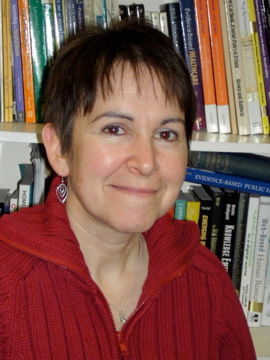
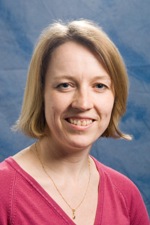
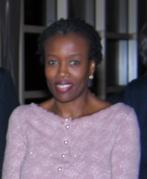
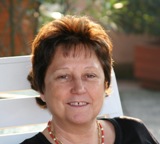
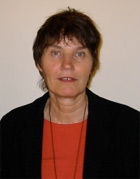
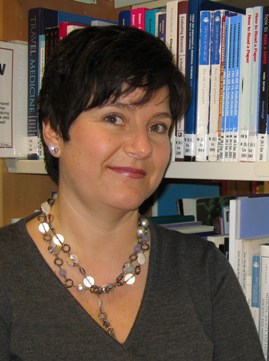


Add Comment